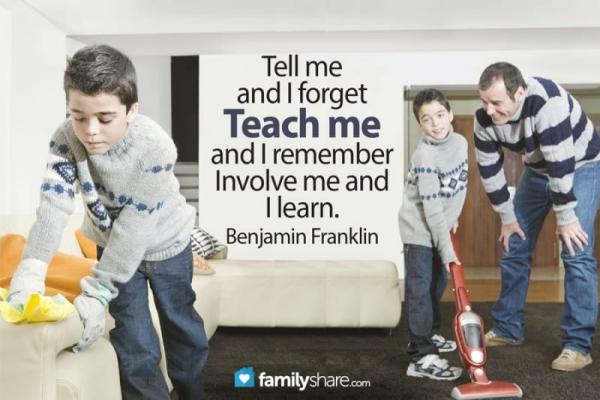
We all want our children to grow up and be independent adults. However, figuring out how to get them there can be challenging.
Good parenting includes teaching and training children along the way so that they can learn and be ready to be completely independent. However, this takes time. Sometimes, we're tempted to just clean the room ourselves or empty the garbage cans when the kids are slow to do their chores. But, if we keep doing everything for our children they will be completely unprepared when they're adults. That is bad for everyone.
Hold many training/teaching sessions
When you or others are teaching or training a child on a specific task, provide several training sessions. Did you know that it takes an average child 7 to 8 presentations to learn something? When you're having your training sessions, you need to repeat them many, many times until the child understands it thoroughly.
Be very specific
While you're training, be VERY specific. Don't just say, "OK, clean your bedroom."� That is meaningless. The child will cram everything under his bed or in his closet and say, "Voila! The room is clean."� OK, maybe he won't say "voila,"� but he will insist it is clean.
So we must be very specific. I often made up 3x5 cards with detailed steps listed. For example, cleaning the bedroom may include the following steps:
-
Make your bed
-
Clear dresser and shut drawers
-
Put all your toys in the toy box.
-
Pick up everything off the floor and put it where it belongs.
-
Check your closet floor so that nothing is left but the hamper and your shoes.
Then you go through each step with the child, so she understands it. Stop after each step and ask, "Do you have any questions on how to do this, or what this means?"� I repeat, be very, very specific.
Be non-judgmental
Finally, be non-judgmental. Tell your child that these are training sessions so that she can learn how to do the task, just like the famous sports people. If he messes up, just say, "Oh, Alex, when we make the bed, we put the pillow here. Can you practice that part?"� Be very clear, and don't criticize his imperfect efforts. Remember, children need eight presentations to learn. Don't stop at one and say, "Didn't I tell you to put the oil cap here?"� Be clear, and repeat the instructions.
Don't lavish praise
Do NOT lavish on the praise. I know most of us are trained as parents, wanting to promote good self-esteem, to lavish on gooey praise until our kids are smothered in it. Don't do it. Kids will either not trust you, or get really lazy.
So put a lid on it. A simple, "That was a good effort for your first time"� or "Good job"� will do.
Don't insist on perfection
Don't insist on perfection for a long time. Just keep training. When she slips up, you can reassure her by saying, "We're just in the training period. You're supposed to mess up. That's called learning. Don't worry. You'll get the hang of it after you practice."�
As a parent, you need to remember that these are training sessions. Your job is to have him trained clearly on the various aspects of the task, to perform the task and successfully master it.
Training sessions are a wonderful part of parenting and learning
Just like a sports coach, we can encourage our kids to learn skills thoroughly and encourage them along in the process.
Happy training!

